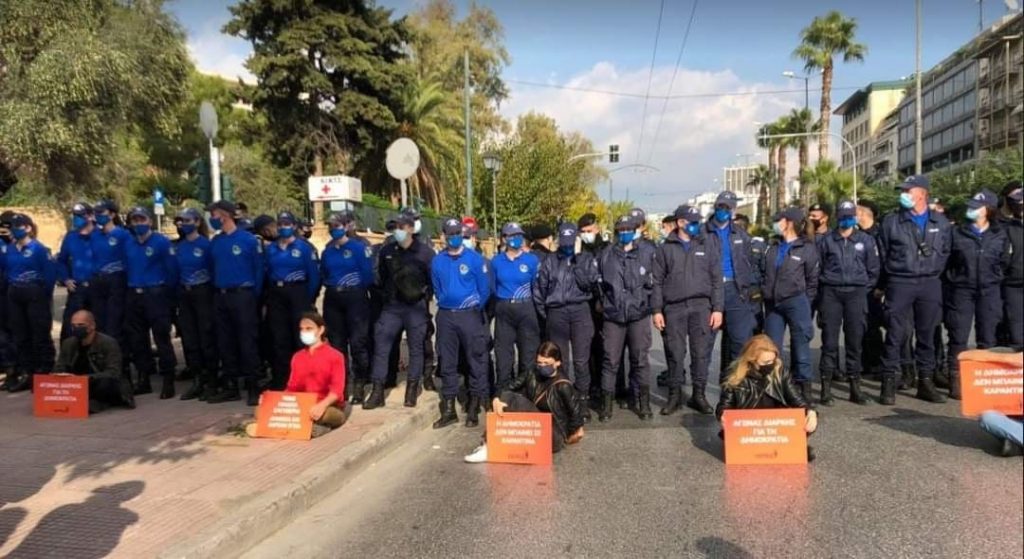
Why are the Labour Party turning their back on the Green Industrial Revolution?
We need a Green New Deal for people and the planet now more urgently than ever, and we must fight for it.
This month saw the release of Labour’s first comprehensive policy paper under Keir Starmer, a roadmap for a green Covid recovery that Ed Miliband touted as “the most ambitious climate recovery plan in the world.”
To the casual observer reading Labour’s ‘Green Economic Recovery’ report, seems to be much to commend. Following a summer of open consultation about the shape of Labour’s ‘Green Recovery’, the report outlines a number of key policies and commitments that would help decarbonise the UK and gently nudge the economy towards being more fair, prosperous and sustainable.
Promising 400,000 green jobs, including a programme of “emergency training” to re-equip workers for a greener economy, and a National Investment Bank, the report makes some sensible suggestions that many Labour members would welcome. Trying to imagine what a post-Covid society will look like is vitally important in this historic moment, and when faced with a terrifying intersection of economic, public health and climate crises, one would hope that the opposition party in the country that suffered the worst recession and highest Covid death toll in Europe would be able to offer a radically transformative alternative.
Sadly Labour’s ‘Green Recovery’ report actually represents a quivering withdrawal from Labour’s bold 2019 manifesto pledge to deliver a Green Industrial Revolution. With pledges to rebuild post-industrial Britain through massive government investment in renewables and deliver over one million green jobs, Universal Basic Services and a rapid decarbonisation, Labour’s economic vision under Corbyn’s leadership offered genuinely transformative policies to the electorate, who ultimately rejected them.
The new ‘Green Recovery’ plan bafflingly drops a number of key policies that are still technically official Labour policy.
They were adopted at Conference last year, and were overwhelmingly backed by members during the consultation period this summer. Labour for a Green New Deal, a grassroots volunteer-led organisation, have called on the party time and time again to keep its promises to members and keep up the fight for a socialist solution to the interlinked climate, economic and public health crises we face.
As part of the much-vaunted consensus building project embarked on by Labour’s New Leadership™, these policies which were supported by more than two thirds of submissions to the consultation were roundly rejected, and instead of a radical vision for a transformed economy and society, Labour quietly abandoned its pledge to decarbonise by 2030.
The ‘Green Recovery’ report might well prove to be just a “first step”, as Matthew Pennycook, Shadow Minister for Climate Change, has suggested, but it would seem rather bizarre for a “first step” towards decarbonisation to follow a momentous leap like the 2019 ‘Green Industrial Revolution’. It’s like Cristiano Ronaldo taking a step towards winning the Champions League by signing for Leyton Orient.
A side-by-side comparison of commitments from the 2019 manifesto and the ‘Green Recovery’ report makes for incredibly bleak and disheartening reading.
An election-winning manifesto could be written almost entirely out of policies that have been dropped: Public ownership of railways and buses, a National Care Service, zero emissions city centres, a Clean Air Act, progressive taxation, Green Energy and Zero Carbon funds for local government and a commitment to a low-carbon economy. It is quite frankly baffling that Labour’s leadership would willingly work themselves into an electoral cul-de-sac that will inevitably play to the advantage of the Conservatives and let down voters who need a Labour government most when they are defeated.
During the election post-mortem which saw the sweeping victory of Sir Keir Rodney Starmer QC in the Labour leadership election, all three candidates for the vacant position offered support for a ‘Green New Deal’, including Starmer himself who pledged to “put the Green New Deal at the heart of everything we do”. It is now clear that Starmer’s 10 pledges were made in bad faith.
The new Leader of the Opposition is utterly allergic to any policy position that would threaten the truce he seems to have to have brokered with the liberal commentariat whose approval he values above that of his own membership (knowing that he is virtually impregnable in his position for years to come, barring a snap electoral disaster). Labour’s abandonment of its 2019 manifesto serves as evidence of a brazen renunciation of party democracy.
From the election of right-winger David Evans as General Secretary, to the postponement of Labour’s Conference due to COVID-19 (no virtual democracy was permitted, perhaps owing to the lack of nationalised broadband), there is an increasing feeling of disenfranchisement and disillusionment amongst Labour members that might threaten to turn into a mass exodus. Even Evans’ appointment itself is technically still subject to Conference approval, but those holding power in the party seem uninterested in such matters.
When compared to meal-mouthed Conservative environmental pledges, such as Boris Johnson’s gleeful proclamation that the UK can become the “Saudi Arabia of wind power”, or his limp announcement of 10 new national parks (another culled policy from Labour’s plan), Labour’s proposals look relatively robust. The government earlier this year had only invested £4bn per year out of the £33bn required to meet its net-zero targets, a miniscule amount when compared with Germany’s £36bn per year investment.
There is little surprise in the Tories being reluctant to combat climate change beyond green capitalism and a woeful 10 point-plan with only £4 billion of new investment.
But given the recent invention of Keynesian economics by Rishi Sunak, it is not beyond the realms of possibility that the Conservatives would perform a characteristically screeching U-turn on green investment and promise to spend on a similar scale to Labour. This looks to be the case, and now the government has pledged to invest £4bn in creating 250,000 green jobs, still short of Labour’s pledge, but not insignificant. Many within the Labour movement are outraged that the party leadership have ceded ideological ground to the Tories, who now have the temerity to call their programme a ‘Green Industrial Revolution’.
One key difference between the two plans that is probably worth repeating is that the Tories are actually in power, and will likely remain so with a huge majority until 2024, leaving them free to slash away at the foreign aid budget and ramp up defence spending by £16 billion. In this context, Labour has not seemed so ideologically bereft, or incapable of challenging the Tories for decades. Starmer and his allies seem happy to spend the next few years pummeling the left into submission or out of the party entirely, from Jeremy Corbyn himself through to those who have the temerity to discuss the former leader’s suspension.
The Labour leadership’s timid concession to centre-right economic orthodoxy is nothing particularly surprising, given that it has been the default position of the Parliamentary Labour Party for much of its post-war history, even during the Corbyn project.
Former human rights lawyer Starmer is happy to whip his MPs to abstain on basic protections for British citizens, such as the right to not be murdered by an undercover member of the Food Standards Agency. Many Labour MPs broadly share the market-worshipping, laissez-faire predilections of their supposed opponents on the opposite benches and seem utterly paralysed by fear when radical ideas are floated by the membership.
An increasingly hard to ignore fault-line is emerging between the young and old within Labour, particularly apparent by the sweeping victory of explicitly socialist candidates in Young Labour elections who are unafraid of calling out the timid socio-economic and climate policies of the new leadership (and to a lesser extent NEC elections which were slightly less clear-cut). A fraught, hostile Labour party that is unwelcoming towards the left is going to be an increasingly toxic prospect for the generation of young voters who will reach maturity by the time of the next election, upon whom Labour’s prospects of victory largely rest.
Interestingly, Labour decided to wait until the result of the American election to announce its ‘Green Recovery’ plan.
Looking across the Atlantic, one useful lesson from Biden’s victory was the overwhelming victory of House Democratic candidates who co-sponsored the Green New Deal. All but one candidate out of the 93 co-sponsors won re-election by running on a policy platform that demanded radical economic and social transformation, rather than the limp appeals to liberal bluster against Trumpian vulgarity and nascent “back to brunch” sentiment deployed by many establishment Democratic candidates who suffered at the ballot box.
Observing these results, it’s clear that Labour took absolutely no notice and decided to plough on with their project of technocratic managerialism, finger-wagging against the Tories and suspensions for ‘wrecker’ socialists. This could have been the moment for Labour to extend a hand to socialists and progressives in the USA and demonstrate a shared, cohesive vision for a decarbonised society, with green jobs for all and a plan to free up atmospheric space for developing countries. Labour looks set to squander this excellent opportunity for international solidarity at a moment when the UK is likely to plunge out of the EU without a deal.
There are hopes that COP26 (postponed until next year) will lead to a radical new internationalist consensus on climate change, resulting in real action (unlike the Paris agreement), but it is difficult to envision G20 countries making a meaningful contribution to tackling climate disaster. Countries in the Global South who contribute a miniscule carbon footprint are those most likely to suffer the ravages of climate destruction, through natural disaster, drought and resource conflict, so the UK must do more to free up climate space for countries that are decarbonising. For instance, electricity in Kenya is 93% powered by renewables. Wealthier nations must contribute to their just transition by cancelling debt in the developing world and opening their borders to refugees.
Ultimately, most of the general public are utterly disillusioned with the mainstream political parties in the UK. People are suffering on a level that would have previously been unthinkable even after a decade of ruinous Tory austerity, and with the country veering in and out of lockdown, hundreds of thousands more job losses are expected in coming months. Even figures as profoundly pro-establishment as Gordon Brown have called for an urgent and immediate anti-poverty program to stave off the threat of ”rebellion” in a deeply divided Britain.
With the breakup of the Union looking more likely than ever, it would take an incredibly transformative, visionary political program of investment to hold the country together.
Since neither the Conservatives or Labour seem capable of offering this at one of the most dire periods in British history, then the UK seems destined for dissolution. The most terrifying prospect of all though is of course the impending climate disaster, and with Labour abandoning its policy of decarbonisation by 2030, the perpetual Tory government is free to dither and crawl towards a net-zero by 2050 target.
Battered and bruised by the events of 2020, we lurch from one disaster to the next, failing to see that the solution to our interlinked economic, social and climate crises has been in front of us for some time now: a Green New Deal for people and the planet.
The views and opinions expressed here are those of the author and do not necessarily reflect DiEM25’s official policies or positions.
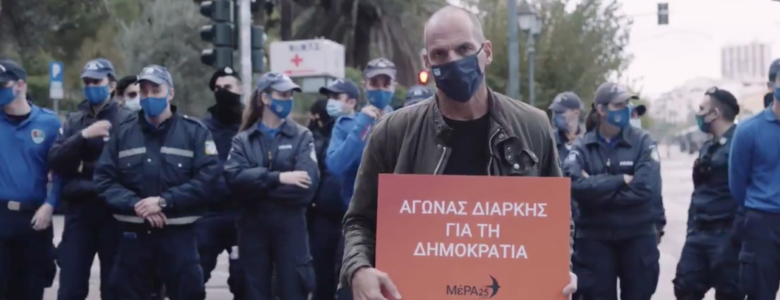
Yanis Varoufakis: “The Greek government has dealt a massive blow against democracy”
Yanis Varoufakis issued a statement on 17 November, the day of student uprisings in Greece.
When 7 MeRA25 MPs marched on behalf of doctors, nurses, teachers and students, they were grossly outnumbered by the Greek police force who obstructed their peaceful march and surrounded them during a sit-in.
Statement:
“Europeans are facing two threats: the pandemic, and the threat to our democracy. Under the cover of fighting the pandemic, this government in Greece today has dealt a massive blow against democracy.
Our party, MeRA25 very responsively asked our members not to demonstrate today, a day — 17 November — which is the traditional day of protest by youth, by workers, by victims of oppression and exploitation. We asked them not to come in order to participate in the effort to fight against the pandemic.
7 members of parliament represented them. And the government sent an order — you can see the police behind us — to prevent us, violating the Greek constitution, from marching, from moving, even from going to the parliament. This is the first step in the Orbanisation of Greece.
Europeans beware, the illiberal democracies that started in Poland and Hungary and outside the EU in Turkey are now spreading; Greece is such an illiberal democracy as of today. We need to unite against pandemic and against the threat to our democracies.”

Oppressed minorities held hostage at the EU negotiating table
Biting the mouth that feeds: Orbán uses migrants, LGBTQIA+ and women to raise walls around an anachronistic idea of the state against ‘liberal’ attacks.
The Polish have started mobilising against the decision of their authoritarian government to further restrict their bodily autonomy. Now, Europe faces another fundamental attack on human rights on the part of the far-right Hungarian government.
On 11 November 2020, right before the second lockdown, Victor Orbán’s government announced a restrictive amendment to the constitution that meddles in the personal lives of citizens.
The draft amendment spearheaded by their justice minister Judit Varga declares that children must be guaranteed an “upbringing based on values stemming from Hungary’s (…) Christian culture”.
Viktor Orbán’s embrace of Christian values is an attempt at reasserting the dominant colonial narrative in its new pandemic oligarchic configurations. Hegemonies have always been built through the exclusion, appropriation and demonisation of historically marginalised bodies, namely women, queer, religious and ethnic ‘others’.
Instrumentalising the COVID-19 pandemic to apply what is known as the “shock doctrine”, far-right movements throughout Europe and around the world are making their most unpopular moves against human rights in what hints at a coordinated strategy driven by opportunism.
It has become apparent, following the veto by the Polish and Hungarian axis on the EU budget and COVID-19 recovery package, that the negotiating table for wanna-be dictators is a place of contradictions.
The patriarchilization of Polish and Hungarian society and its polarisation against the EU has made coming to political compromise impossible without putting the very concept of masculinity, embodied by the leader of the state, in question.
Victor Orbán is holding to ransom oppressed minorities in Hungary to force the hand of a union desperate to mitigate the economic fallout of pandemia. In the case of Orbán’s Hungarian project, he cannot be seen by his electorate as ‘giving in’ to the EU and its demands to uphold the law of the Union. This would certainly create doubts around the credibility of his politics–the politics of systemic violence, division, racism and patriarchy enacted through economic, environmental, racial and gender injustice, delegitimization and abuse.
As Robert M. Cover brilliantly points out in his essay on violence that this is a politics enacted through language and normative interpretation in order to deliberately inflict “pain in order to destroy the …. capacity to create shared realities” necessary for any healthy society.
Power and wealth does not come for free, we are tired of being asked to pay the price. The LGBTQIA+ community is here to stay: Rainbow rights are Human Rights!
Photo Source: European Council Newsroom.
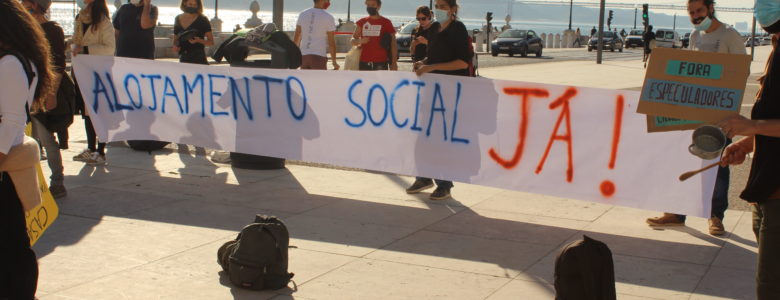
Protestors in Portugal: “The city is for those who live in it, not for profit”
On 12 November, DiEM25 members participated in a protest in Lisbon on the lack of access to decent housing.
We participated as a member of the collective Acção pela Habitação (Action for Housing), which gathers various political movements in Lisbon concerned with access to housing.
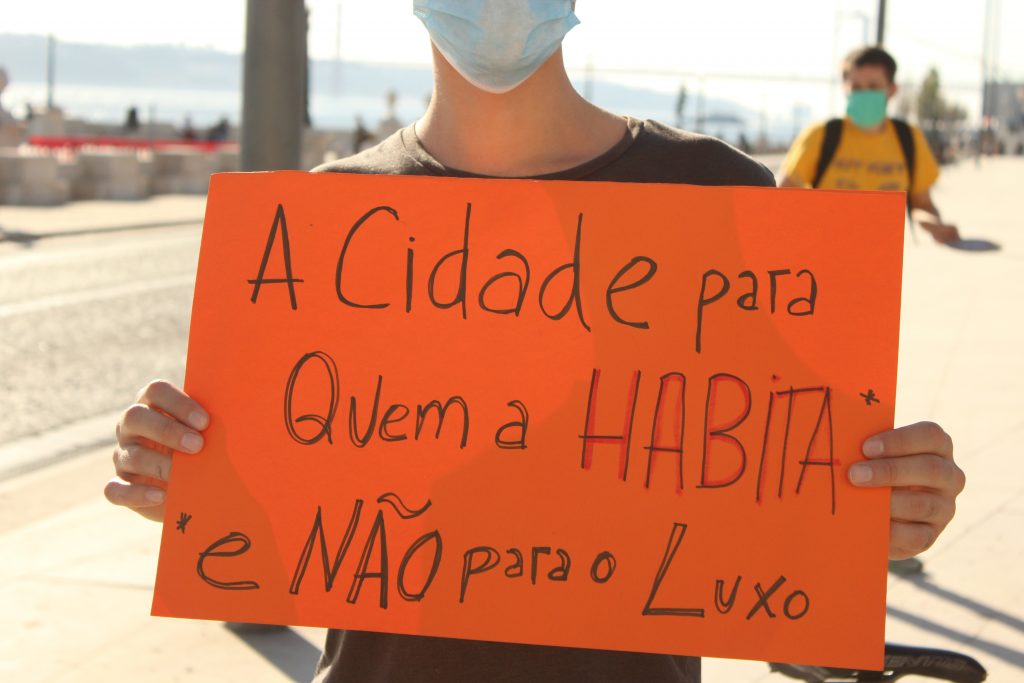
Photo: “The city is for those who live in it, not for profit.”
Housing access was already bad before March 2020, but the current crisis has made it a desperate time for many people in urban areas.
Even though the current pandemic and its economic crisis have led to unemployment and a considerable decrease in the income of portuguese households, the price of rent hasn’t decreased for the most part. In the few cases where the prices went down, the decrease is, on average, only 15%. This is practically nothing when we take into account the big hit that portuguese salaries and employment have taken.
This protest was held in front of the ministry of finances, and it had the main objective of criticising the fact that the government has made a lot of promises in terms of housing without delivering on those promises. They promised investment in public housing, for example, for purposes of electoral and parliamentary negotiation gains. But these have not been executed by this department of government.
This happens both through inadequate regulations on budget spending and simple blocking of transfers, justified by deficit control. The current government uses various tactics. First, it makes it harder for the money to be applied through regulations. Second, it puts it on the budget, but then says that to control the deficit, they can not allow for it to be spent, after all.
Out of 166 million euros that the government had promised in the last two budgets, only 8% were executed, a ridiculously low number. During the protest, we brought pans in order to make some noise and symbolize that the current rent prices are actually taking our ability to buy basic needs like food.
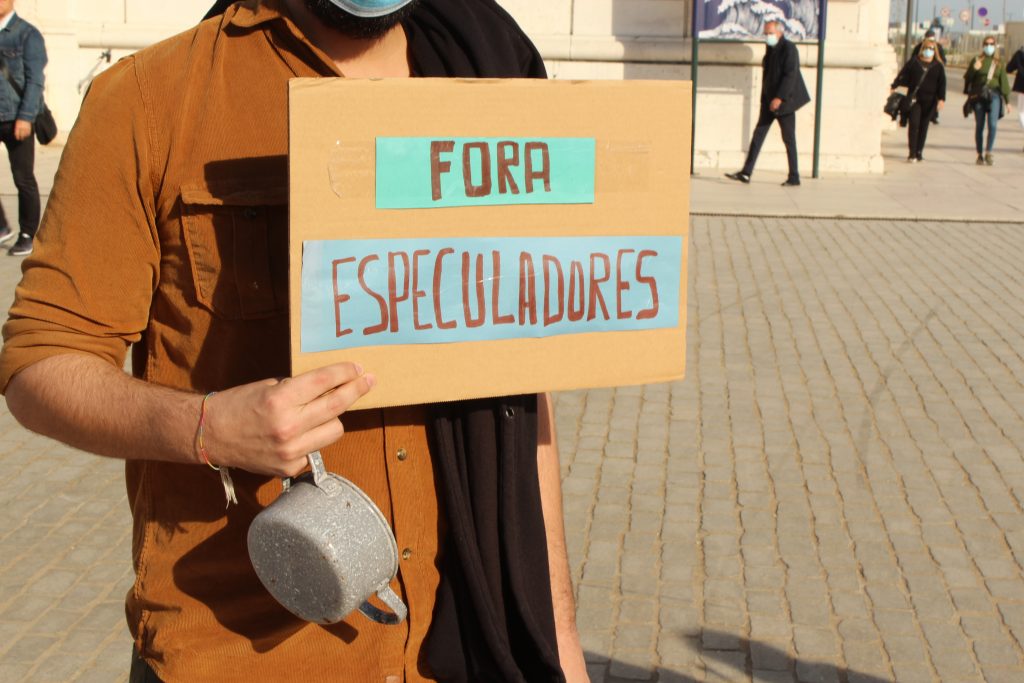
Photo: “Out with the speculators [of housing prices]!”
Our main demands are:
- More investment in public housing and rent support, and a fulfilment of the previously promised values
- An immediate end to the so-called “golden visas” in Portugal, a system created for foreign investors, that lends itself to housing market speculation and money laundering
- The removal of a new law on public housing investments, that allows for the state to involve the private sector, which has a suspiciously low clarity under which conditions this might happen
- The creation of a rent cap system, following the example of other cities like Berlin
- A complete stop on evictions, unless the state can provide an adequate solution for the people removed from their homes
- That the public buildings that aren’t currently being used, are made available for social projects and emergency housing, especially during the pandemic
Despite our attempts to approach the entrance of the ficances ministry, the police stopped us. Currently, the portuguese police has greater powers due to the pandemic emergency measures, something that can be used to curb democratic protests.
The collective Acção pela Habitação, which many DIEM25 members in Portugal are a part of, intends to continue fighting for this issue through December and next year, having already planned some online and public sensibilization campaigns.
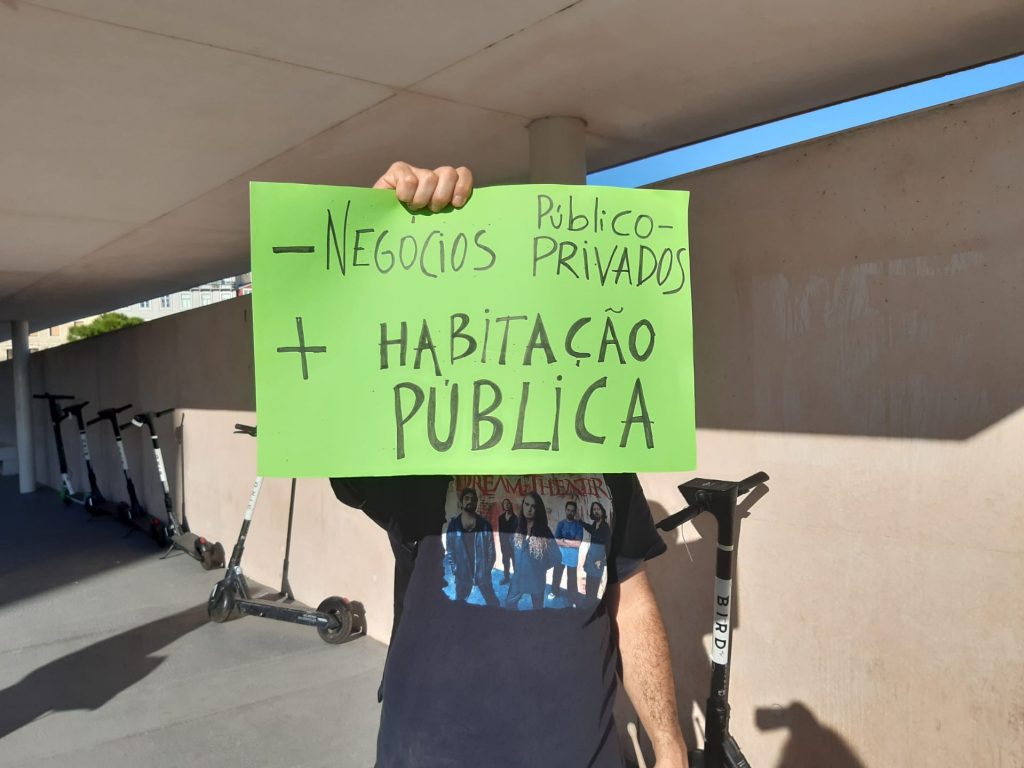
Photo: “Less public-private partnerships, more public housing.”
The time has come for a Rentvolution!
This is more than a Portuguese issue. All over Europe, rents have increased, and moratoriums on rent are expiring whilst also placing the burden of COVID-19 on renters who are accumulating debt. This situation threatens to reinforce the budgetary pressure of rent through overburden and eventually trigger mass household expulsions, catapulting the numbers of poverty and homelessness to a historic high. Moreover, the pressure on public debt could hinder the effort to adapt Europe for the still ongoing climate crisis.
David Silva is a member of Setúbal DSC, whose members participated in this protest and helped to document the event.
Sign our Europe-wide petition on the right to housing: Free low-income Europeans from rent burden.
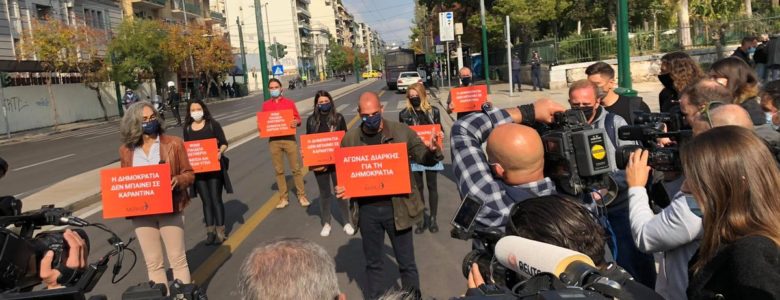
MeRA25 marching for democracy in Greece: “Above all we observe the constitution”
Today, MeRA25 MPs marched for the doctors, nurses, teachers and students being abandoned by a “government that does not support them.”
In order to pay tribute to the 1973 student uprising, 7 MeRA25 MPs marched in Athens while wearing masks and maintaining social distance. However, they were stopped before they could reach the US Embassy, where they staged a sit-in. This obstruction of a peaceful march constitutes a constitutional offense.
The Communist party also marched en masse wearing masks and observing distances, but were broken up by the police, with many arrests and a lot of tear gas having been deployed in downtown Athens.
#Πολυτεχνειο #Live #ΜεΡΑ25 pic.twitter.com/lHcrW3aX3i
— ΜέΡΑ25 (@mera25_gr) November 17, 2020
Greek police officers argued that everyone should ‘observe the measures to protect public health’, but it is also important to be able to take action to preserve the health of our democracies.
Yanis’ response to this was indeed that “We call all citizens to respect the measures in place for their safety, but we also call on the government not to polarise the situation by pitching the police against parliamentarians. We need to combine both the protection of public health, and the protection of the Constitution.”
While MeRA25 MPs respected the social distancing rules, the members of the police were stacked behind them with nothing but a face mask for protection. This is outright hypocrisy from the Mitsotakis right-wing government and a cynical sacrifice of the young women and men of the police on the altar of authoritarianism. In this situation, it appears that social distancing is being used as a political weapon to bully demonstrating parliamentarians and citizens rather than protect public health and secure the ailing public healthcare system.
"We call all citizens to respect the measures in place for their safety. But we also call on the government not to polarise the situation by pitching the police against MPs. We need to combine the protection of public health & the protection of the Constitution." @yanisvaroufakis pic.twitter.com/Ar1hNENbw2
— DiEM25 (@DiEM_25) November 17, 2020
After hours of sitting a few hundred metres from the US Embassy, some of our MPs are still there, while others have left and are now heading to the Police Headquarters to help other protestors who were arrested during the day’s events.
Yanis Varoufakis’ general statement to the press was the following:
“We are here to support the doctors and nurses who are currently being silenced by a government that does not support them. The teachers and students abandoned in schools by a government that has failed to take measures against the pandemic. All those who are locked in their homes today and all they can look forward to after the end of the pandemic, that we hope will come soon, is the auctioning of their house or their shop. The workers and the unemployed, who are currently suffering, at a time when the oligarchy is preparing for a feast. We are here instead of the youth of MeRA25 and our members. We thank them for heeding the call of our Political Secretariat not to attend today’s march in order to observe the health regulations. As you can see, we are only 7 deputies, keeping a safe distance. The march for the Polytechnic Uprising has been recognized in our history as the top moment when Greek women and men have the opportunity to protest against an establishment that undermines Education, Health, Democracy, Freedom and, ultimately, Dignity.”
Across Europe, we have seen the pandemic infringe on citizens’ rights to peaceful protest.
Yanis Varoufakis highlighted the importance of remaining vigilant of the use of COVID-19 measures to restrict citizens’ rights across Europe: “Today this government, hiding behind the pandemic, has prevented our MeRA25 MPs from marching in Athens. This is a clear violation of the Greek constitution & it’s not an accident. Democrats across Europe beware: it’s coming in a place near you.”

MeRA25: “On 17 November, We March for Democracy and Freedom”
Fotini Bakadima MP on the fight against Greece’s slide into authoritarian rule.
Each year in central Athens, we march to commemorate the 1973 student uprising against Greece’s military dictatorship.The march is a remembrance not only of the bloody suppression of the students’ heroic uprising, but of the entire Greek nation’s resistance against fascism — a struggle that led, at its end, to break the military junta’s 7-year tyranny. Annually, over 20,000 take part in the march from the National Technical University of Athens to the U.S. Embassy, signaling their resistance to domestic dictators and imperialist forces alike.
This year, the Greek government is determined not to allow any of the traditional celebrations to take place, especially the commemoration rally to the US embassy, blaming their opposition on concerns around the COVID-19 pandemic.
Against this ludicrous proposition, MeRA25 announced that its 9 MPs will march wearing masks and maintaining social distance, in order to pay tribute to the 1973 student uprising. The government responded with threats: the Minister of Civil Protection warned that MeRA25 MPs would be arrested should they choose to march; the Police declared that no public gatherings of four people or more were to be allowed from 06:00 a.m. 15 November until 09:00 pm 18 November 18.
In other words, they imposed a four-day ban throughout Greece in a blatant attempt to kill off our public spirit of resistance.
This unprecedented decision not only suspends Article 11 of the Greek Constitution and the right of citizens to assembly, but also violates the Constitution as a whole, since only the Parliament can suspend Constitutional provisions. That is why the Greek Association of Judges and Prosecutors issued a statement on Sunday 15 November 15 afternoon, rendering the “police chief decision as “unconstitutional” and stating that it should be “immediately revoked.”
I should stress that a total ban on all public gathering by universal suspension of Article 11 of the Constitution has been implemented only twice in the past. First, on 21 April 1967, when the colonels took power with a coup-d’etat, initiating the military dictatorship. And second, on 17 November 1973 itself, when the colonels entered the Polytechnic school with a tank. It is the first time after the restoration of Democracy that this right has been banned.
In this context, MeRA25 — along with the KKE and Syriza — issued the following joint statement condemning this decision:
“This is a deeply undemocratic and also unconstitutional decision, as the Greek Association of Judges and Prosecutors points out, as it violates the core of the constitutional right of assembly (Article 11), imposing a total unauthorized suspension of assembly and not a precise regional restriction… The government has a huge responsibility for this development. Even now the Government has to withdraw this unacceptable decision.”
On Monday, a resolution of protest against the ban on rallies was handed over to the President of the Hellenic Republic, the President of Parliament and State Minister by representatives of the 3 parties, while MeRA25 lawyers also filed applications for cancellation and suspension against the decision with the Council of State, Greece’s Supreme Administrative Court, for violation of the principle of proportionality (based on a European Parliament resolution and the relevant decision of the German Constitutional Court) and for lack of specific and informed reasoning in curtailing the right of assembly.
Many have warned that the pandemic could become pretext for a creeping authoritarianism.
It is happening right here in Greece — and we will not permit it. No one can change the Constitution by invoking this ludicrous citation.
MeRA25’s elected MPs will attempt a symbolic march, taking all necessary precautions. Democracy must be protected, and 17 November along with it. We will march as representatives of Democracy and Freedom.
Fotini Bakadima, MP of MeRA25 (2nd Pireaus District).
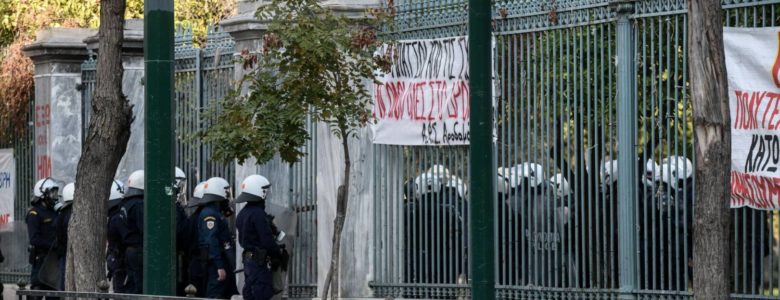
Under the pretext of fighting the pandemic, Greece slides into authoritarianism
This year, amid the COVID-19 pandemic, the government’s decision to ban not only the mass demonstration but also any symbolic march by a few MPs to commemorate the anniversary (as had been planned by MeRA25), was met with harsh criticism in Parliament from, besides MeRA25, the Communist Party of Greece and SYRIZA.
In the early hours of 17 November 1973, a tank crashed through the main gate of the occupied Athens University, putting a bloody end to a mass student uprising against the brutal military junta that had ruled Greece since 1967. The anniversary of the Polytechnic uprising against the US-instigated dictatorship in Greece is a national holiday in the country, commemorated ever since by a demonstration that begins at the Polytechnic campus and ends at the US Embassy.
In a sign of unity rarely seen in local politics, MeRA25, the Communist Party and SYRIZA signed a common statement.
They called on the government to revoke the undemocratic, unconstitutional ban which cannot be justified on the grounds of protecting public health. Today a common delegation comprised of one MP from each party visited the Speaker of Parliament and the President of the Republic to declare their parties’ common stance.
To support this historic initiative, and especially if you are Greek or live in Greece, sign the petition here.
Several days before the occasion, the University building is hidden behind a wall of Police forces and armoured vehicles, eerily echoing the dark day that is commemorated.
On 13 November, dozens of youngsters who entered the Polytechnic and another university campus ahead of the anniversary were forcefully evacuated and 92 were arrested. In cities around Greece, citizens were officially called in for questioning, regarding posts on their social media where they simply announced their will to attend the march.
On 15 November, a police announcement caused further unease amongst progressives:
By decision of the Chief of the Hellenic Police Force Lieutenant General Michail Karamalakis, all public gatherings of more than 3 people throughout Greece are prohibited from the morning of the 15 until the evening of the 18 of November.
MeRA25 called the decision an attack on all fronts against democracy and civil rights, accusing the government of consciously sliding, under the pretext of the pandemic, into anti-democratic practices that foreshadow a permanent restriction on civil rights (not to mention discouraging citizens from trusting the government’s rules regarding the deadly pandemic).
MeRA25 has decided to disobey the decision of the government and the Chief of the Police.
Tomorrow, on the anniversary of the Uprising, a symbolic representation of the party made-up of its MPs including Yanis Varoufakis, will march to the Embassy, wearing masks and maintaining social distancing, to commemorate the historic event that so clearly upsets the current government
Today MeRA25 lawyers also filed applications for cancellation and suspension against the decision with the Council of State, Greece’s Supreme Administrative Court, for violation of the principle of proportionality (based on a European Parliament resolution and the relevant decision of the German Constitutional Court) and for lack of specific and informed reasoning in curtailing the right of assembly.
The climate of intimidation cultivated ahead of tomorrow’s anniversary is exemplified in a remarkable column by the flagship daily of the conservative Press, “Kathimerini”. The columnist asks the police to hit parliamentary party leader Yanis Varoufakis, but to be careful to do it not at the start of the march, but rather when he reaches the US Embassy, so as “not to dispense with the comical element” and afford maximum pleasure to onlookers.
With stakes that high, tomorrow is a day that will one way or another shape the future of Democracy, in its birthplace and beyond. DiEM25 and MeRA25 couldn’t possibly be anywhere else but in the heart of the battlefield.
Please follow our social media to stay informed of developments.

Will the Biden administration commit to progressive changes?
Biden won off the back of progressives, but will he implement their proposals?
From the perspective of members of DiEM25’s South Holland local group, the moment Fox News declared Biden as President Elect of the United States, the machinery that drives global capitalism began launching lifeboats from the Trump ship. In the midst of political rugs being pulled from under his feet, President Trump tee’d off his 294th round of golf and posed for wedding photographs. Maskless, he gave a confident pose while his security detail nervously surveyed the astounded onlookers, with one, in excitement, declaring “I can’t breathe”. This surreal scene characterised the presidency of Donald Trump perfectly.
Meanwhile, the machinations of the Democratic and Republican establishments appeared to be competing for a winner-takes-all contest for the White House. The reality of this spectacle leads to a continuation of the status quo as its true destination. By bailing out banks, reducing taxes for the rich and privatising social services, democratic institutions legislate at warp speed. When tasked with undoing the evils of the past, these same institutions remain gridlocked. For example, attempts at designating lynching as a federal crime have failed since 1900, with the most recent attempt — in June 2020 — blocked due to worthless debate.
While the spectre of racism continues globally to haunt its victims, the phantoms of finance thrive in The Netherlands. The country currently attracts over 5 Trillion US$ in Foreign Direct Investment, of which US$ 3.3 Trillion is routed into shell companies with “no substance and no real links to the local economy”. The Kingdom provides such extensive tax-planning advantages for multinationals that even well-known Dutch corporations, such as Shell and Philips, pay no tax on profits in The Netherlands.
Proposition 22: workers taken for a ride in Silicon Valley.
Uber, with its international headquarters in Amsterdam, has been accused of placing employees under significant pressure to voluntarily resign to “circumvent Dutch labour laws on redundancies”. In another case, a group of Uber drivers filed a lawsuit in California, claiming the use of “coercive tactics” to force support for Proposition 22, while labour activists in that State — urging against this proposition — were targeted in what appears to be “coordinated social media campaigns”. Proposition 22 became the most expensive ballot initiative in California with supporters — including Uber, Lyft and DoorDash — spending nearly US$ 203 million. Opponents — mostly unions, non-governmental organisations and other grassroots movements — pooled around US$ 20 million to make their voices heard.
The affirmative vote on Proposition 22, in one fell swoop, created an alternative classification for “app based” workers, depriving them of recently won rights in the State of California. Neither was the US Post Office — already under tremendous financial pressure — spared during this campaign.
Supporters of the initiative classified themselves as a non-profit organisation that “pertain to social welfare organisations”. By doing so, the corporations saved US$ 1.5 million on postage. While the incoming Biden administration has vowed to reverse the misclassification of workers in the “gig economy”, the selection of his transition team for labour issues indicates, at best, a compromise with corporate America.
The Democratic establishment in the US, with a solid record of supporting corporations over progressives, finds itself at a moment of reckoning.
This makes us sceptical about whether the Biden administration will commit to the changes that progressive citizens and movements have demanded in the United States – including:
- Expedited enactment of the Green New Deal;
- Systemic reform in policing;
- Social, racial and gender equality; and
- End to global military interventions.
These calls continue to meet deaf ears across both aisles of Congress. While the impacts of climate change, social injustice and inequality continue unabated, the Green New Deal languishes under the weight of eleven committees in the U.S. Congress. In what Bernie Sanders called the first priority of these elections, the grassroots worked tirelessly to push Biden over the line and expect to be thanked “not with just applause, but with policy”.
The appointment decisions during the transition period will set the tone for the next administration and its appreciation of the grassroots movement. Judging by Alexandria Ocasio-Cortez’ warnings to Biden, we may witness the re-emergence of the old-guard that will continue to place the interests of Wall Street ahead of Main Street.
Placing the interests of those concerned with profit over people and planet will lead to the collapse of human societies. The Netherlands – with 50% of the country at 1m or below sea-level – will not be immune to rising sea-levels brought on by climate change. Current worst case scenarios see the “need to lead 10 million people somewhere” in the not too distant future. A globally coordinated and locally implemented Green New Deal has the answers to reconstructing broken social and economic systems, charting a course for a decolonised future that is in harmony with our only home planet. Join our movement in realising this vision.
This article was authored by Amir Kiyaei who is a member of the Zuid Holland 1 DSC.
Photo Source: Butter my Parsnips on Flickr.
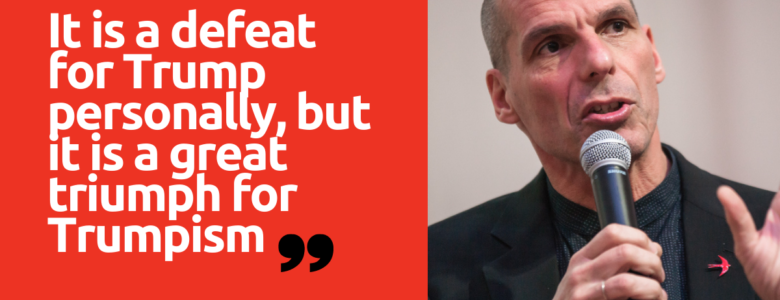
Yanis Varoufakis on Trumpism, European fiscal discipline and the US-China Cold War
On 10 November, Yanis Varoufakis was in conversation with Eurointelligence’s Wolfgang Munchau on Trumpism, European fiscal discipline & the US-China Cold War.
Highlights
US Elections: I saw your Guardian article and my specific fear is that they start misinterpreting the whole thing and that they consider this as a rejection of Trumpism and reinforcement of the old way of transatlantic relations, that they see the defeat of Trump as a victory of centrist politics and that we can return to the multilateralism of the Obama years. Am I too alarmist in this interpretation?
“I don’t think unfortunately that you are too alarmist. The greatest problem with the EU is that because of its architectural design faults, there is a tendency to adopt the strategy of the least resistance and always to kick the can down the road, not to confront the difficult issues if they can avoid it.”
“The Biden victory has allowed them more space to kick the can down the road. In my conversations with some of the key players in the EU you can see that when you actually have a serious conversation with them, they do understand that the Biden administration is not going to constitute such a dramatic change in US posture vis à vi the EU. But in the theatre of public opinion, it gives them an opportunity to avoid the important questions involving international trade, the World Trade Organisation, the new cold war with China, serious conflict between the EU and the US regarding what free trade means.”
New divisions: How do you see the victory of Trump himself? Is this a purely right wing conservative thing or is there a divide going on that has its reflection in Europe as well — and not a divide between populists and others but a different kind of political divide that might play out in the next few years?
“It is a defeat for Trump personally, but it is a great triumph for Trumpism. Because the slump that is going to follow the COVID-19 is going to galvanize the right. The Trumpist have this — however fake feeling — that they have been robbed of the white house. They are going to take over the Republican party even more powerfully.”
“Beyond left-right, there is a very strong working class support for Donald Trump (…) due to the fact that on one hand you have socialism for the rich and austerity for most other people, and the complete incapacity of the establishment within the democratic party to address that beyond saying all the right things regarding racial harmony, regarding tolerance, regarding civilised mode of behavior which are all great things but they come to nothing when it comes to the working class men and women supporting Trump when their jobs are disappearing, when their life prospects are diminishing.”
What should the Left do: What do you think the Left should do in the US? Should they support Biden, should they try to drive a hard bargain or should they try to prepare for the post-Biden administration — play the long game and really try to capture the party?
“The news I’m receiving from the other side of the Atlantic by my friends in the Left Caucus, in the Bernie Sanders team, in the AOC team, people I speak to — they are livid, they are bereft. The expression they used is ‘Biden has been liberated from us’ because hiding behind the loss of the senate and the loss of the landslide, Biden who was not very keen on the Green New Deal will now turn around and say: ‘Well, I wanted to, I agreed with you to push it forward, but I just can’t.'”
“The biggest problem that people like Alexandria or Bernie will have in the next two years during the slump that’s coming their way is: what do they say to the people that they dragged out of their homes and convinced to go to the polling stations or fill in the postal vote in favor of Biden? (…) The vote was in the end won by these people. These people will turn around to their own Lefties in the democratic party and and say why did you make me do that? He’s not doing anything for us.”
“While the right will be galvanizing, hardening, taking over the Republican party, becoming more unified, less fragmented, outside politics will be in disarray for structural reasons.”
“They need to continue to press Biden and the media in the direction of the Green New Deal and they have to keep reminding them that Trump is the result of Obama. (…) It was the democratic radical center which paved the ground for the proto-fascism of Trump. The Left must keep reminding the Biden team that it was they and their policies that made it possible for somebody as misanthropic as Trump to move into the White House even if it was for four years.”
European Union: What should be the European reaction to what you call the ‘triumph of Trumpism’ and the defeat of Trump?
“The same historic process that we are observing in the United States is undermining the European Union. Macron’s victory the renaissance of Angela Merkel have lulled the liberal establishment into a false sense of security. COVID-19 is conspiring with the stagnation that the EU and the imbalances that have been growing during the Eurocrisis — they have conspired to create a wonderful breeding ground for right wing xenophobic populism.”
Recovery Fund: Is the problem the size? Is the problem that it is anchored in the EU budget? What should they have done instead, or could still do?
“The problem is three-fold. It is the size, it’s micro-economically puny. It is the fact that it is embedded in the EU budget which makes it very cumbersome; it will be a very long time before a single penny or cent finds its way where it’s needed. And thirdly and far more importantly, the dynamic of it is economically regressive.”
“What could they have done instead? Well, our movement DiEM25 came out on the 10 March with a 3 Point Plan.”
EU foreign policy: The EU is currently struggling to find a common position on China, with different views. Angela Merkel has said that she opposes any sanctions, she doesn’t think human rights are that important as to stop trading. The Americans have called your country the ‘head of the dragon’ for the Belt and Road programme. Do you think the strategy towards China is changing?
“Look, I am an ardent critic of the Chinese communist party’s authoritarianism. I came out, supported with all my strength the students in Hong Kong and in particular during the fight for the HK Polytechnic, which was abysmal, the violence used against those students. The muslim minorities in China are very high in my priorities. I certainly think that human rights are crucial and can never be sidelined by international trade priorities. At the same time, I am aghast at the prospect of a new cold war between the West and China. China is very complicated, the best and the worst can be found in that country. There are boisterous democracies as we speak in certain precincts in China where the Chinese communist party’s choice of prefects is overthrown through elections. We have an important trade union movement. From my Left-wing perspective, there are people inside the communist party (…) they are criticising very severely and quite openly the economic policies and social policies of the Chinese government — adopting a general anti-Chinese posture at the moment. Embracing a new cold war would be devastating — it would be devastating for our people in China, for democrats in China, minorities in China, it wouldn’t be good for them if we adopted a Trumpist or even Biden opposition to China.”
“Europe should take a nuanced approach, we should support minorities in China, we should support democrats, we should criticise the Chinese Communist parties abuses of human rights while at the same time talking to them.”
EU foreign policy: What should we do about Russia? The Germans have their pipeline almost completed, I think they are 60k short. The US congress has made threats that the completion of that pipeline would be met with severe reprisals. Should the EU side with Germany? Should the EU reflect on its relations with Russia?
“It certainly should reflect on its relations with Russia (…) I’m not a friend of Putin but at the same time I don’t want to see a cold war with Russia either. It is essential that again in exactly the same way that we should support human rights in China, we should support human rights in Russia, we should support those who want to oppose the imperialistic tendencies of Vladimir Putin but we should not turn Russians into the enemy of the European Union. I am very adamant on that.”
“When it comes to energy I think that we should have a serious investment in a Green New Deal.”
